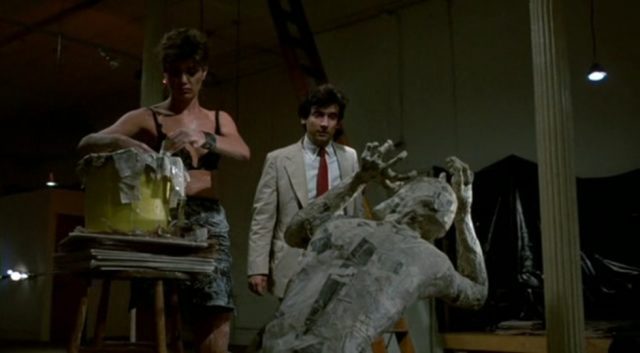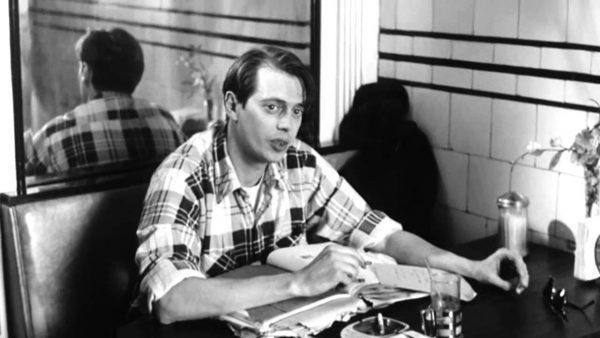
Steve Buscemi stars as a New York City nebbish with big dreams in Alexandre Rockwell’s In the Soup
IN THE SOUP (Alexandre Rockwell, 1992)
IFC Center
323 Sixth Ave. at West Third St.
Opens Friday, June 29
212-924-7771
www.ifccenter.com
www.factorytwentyfive.com
 The 2018 Tribeca Film Festival might have hosted gala anniversary screenings of Scarface and Schindler’s List at the Beacon with impressive rosters of superstar guests and high price tags, but the one to see was Alexandre Rockwell’s 1992 black-and-white indie cult classic, In the Soup. If you missed that reunion, you have another chance to catch the film on the big screen when it opens June 29 at IFC Center. The twenty-fifth-anniversary screening is a case of life imitating art (imitating life): The black comedy is about the fabulously named Adolpho Rollo (Steve Buscemi), a ne’er-do-well New Yorker living in a run-down apartment building, working on his master opus, a five-hundred-page screenplay called Unconditional Surrender that he believes will change the face of cinema itself. A familiar New York story? Perhaps, but the film was largely unfamiliar to almost everyone but the most dedicated enthusiasts, since it has been out of circulation for most of its existence. A few years ago, In the Soup was down to one last, damaged archival print, but distribution company Factory 25 began a Kickstarter campaign to restore the film in time for its quarter-century anniversary, somewhat mimicking Adolpho’s efforts to get his movie made — which, in turn, is based on Rockwell’s attempts to make In the Soup in the first place, as many of the characters and situations in the film are based on real people and actual events.
The 2018 Tribeca Film Festival might have hosted gala anniversary screenings of Scarface and Schindler’s List at the Beacon with impressive rosters of superstar guests and high price tags, but the one to see was Alexandre Rockwell’s 1992 black-and-white indie cult classic, In the Soup. If you missed that reunion, you have another chance to catch the film on the big screen when it opens June 29 at IFC Center. The twenty-fifth-anniversary screening is a case of life imitating art (imitating life): The black comedy is about the fabulously named Adolpho Rollo (Steve Buscemi), a ne’er-do-well New Yorker living in a run-down apartment building, working on his master opus, a five-hundred-page screenplay called Unconditional Surrender that he believes will change the face of cinema itself. A familiar New York story? Perhaps, but the film was largely unfamiliar to almost everyone but the most dedicated enthusiasts, since it has been out of circulation for most of its existence. A few years ago, In the Soup was down to one last, damaged archival print, but distribution company Factory 25 began a Kickstarter campaign to restore the film in time for its quarter-century anniversary, somewhat mimicking Adolpho’s efforts to get his movie made — which, in turn, is based on Rockwell’s attempts to make In the Soup in the first place, as many of the characters and situations in the film are based on real people and actual events.
With wanna-be gangster brothers Louis Barfardi (Steven Randazzo) and Frank Barfardi (Francesco Messina) breathing down his neck for the rent, Adolpho decides to sell the last thing of value (at least in his mind) that he owns, his screenplay. (In real life, Rockwell sold his saxophone to help get In the Soup financed.) His first offer is not quite what he imagined, involving a pair of cable TV producers played by Jim Jarmusch and Carol Kane. But next he meets Joe (Seymour Cassel), an older, white-haired teddy bear of a man who may or may not be connected. Joe is so excited about making a movie that he can’t stop hugging and kissing — and even getting in bed with — a confused Adolpho, who really has nowhere else to turn. Adolpho wants his next-door neighbor, Angelica (Jennifer Beals, who was married to Rockwell at the time), to star in his film, but she wants nothing to do with him, although he does succeed in making Angelica’s estranged, and plenty strange, husband, Gregoire (Stanley Tucci), mighty jealous. Adolpho is also terrified of Joe’s mysterious, apparently rather dangerous, brother, Skippy (Will Patton). Little by little, the money starts coming in, but Adolpho and Joe start having creative differences about fundraising and moviemaking, leading to a series of even odder situations with more bizarre characters.
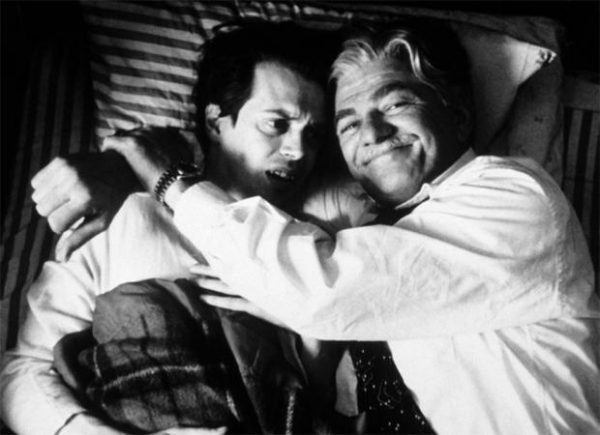
Adolpho Rollo (Steve Buscemi) meets a strange bedfellow (Seymour Cassel) in indie cult classic
A kind of cousin to Jarmusch’s 1984 gem, Stranger than Paradise, Rockwell’s third feature (following Hero and Sons) was made on a shoestring budget, shot in color by cinematographer Phil Parmet but then transferred to black-and-white to obtain a stark, drenched look. Veteran character actor and Cassavetes regular Cassel and up-and-coming actor/fireman Buscemi form a great comic duo, Cassel filling Joe with an unquenchable thirst for all life has to offer, Buscemi imbuing Adolpho with a rigid, sheltered view of existence, a young man lost in his own warped reality. “My father died the day I was born. I was raised by Fyodor Dostoevsky and Friedrich Nietzsche,” Adolpho says, as if that’s a good thing. Patton is a riot as the menacing Skippy, while Beals and Tucci have fun with their accents. The fab cast also includes Debi Mazar as Suzie, Elizabeth Bracco as Jackie, Sully Boyar as the old man, Pat Moya as Joe’s companion, Dang, Ruth Maleczech as Adolpho’s mother, Michael J. Anderson as a drug dealer, and Sam Rockwell (no relation to Alexandre) as Angelica’s brother, Pauli. In the Soup is also a great New York City film, with several awesome locations. The film won the Grand Jury Prize at Sundance, beating out Allison Anders’s Gas Food Lodging and Quentin Tarantino’s Reservoir Dogs (Cassel also won for acting), but the distribution company handling the picture went bankrupt shortly after releasing it, resulting in its scarce availability, which was a shame, because it’s an absolute treasure. But now it’s back and looking better than ever. (Coincidentally, Rockwell, Anders, and Tarantino were three of the quartet of directors who made the 1995 omnibus Four Rooms, along with Robert Rodriguez.) Buscemi and Alexandre Rockwell, who went on to make such other films as Somebody to Love, 13 Moons, and Pete Smalls Is Dead (with many of the actors from In the Soup), will take part in a Q&A following the 7:15 show on opening night at IFC.
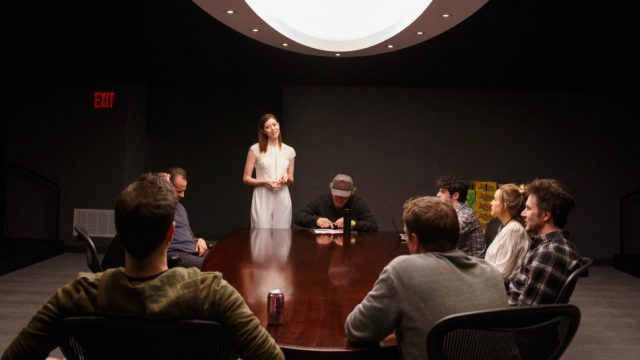
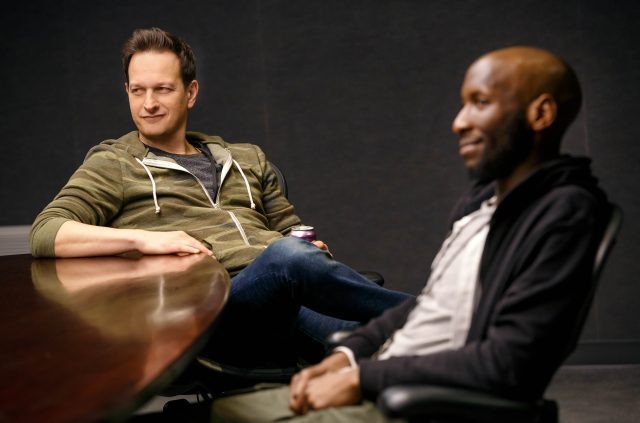
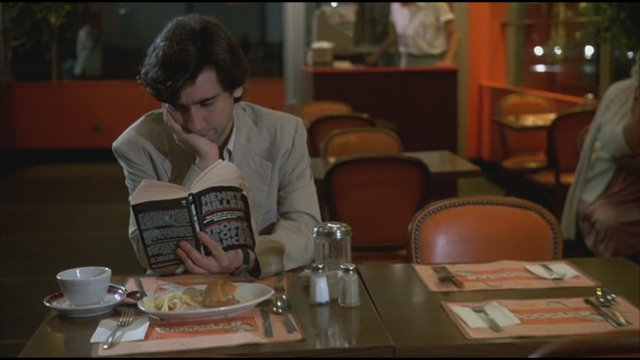
 “We are all alone here and we are dead,” Henry Miller writes in the first paragraph of Tropic of Cancer, which is the book narcissistic word processor Paul Hackett (Griffin Dunne) is reading in a New York City coffee shop, catapulting him into a harrowing downtown nightmare in Martin Scorsese’s brilliant horror comedy, After Hours. Dunne, in one of his two best roles — the other was in John Landis’s very different horror comedy, 1981’s An American Werewolf in London — is exceptional as Hackett, a stand-in for the proverbial everyman seeking safety and home but bedeviled by circumstance, again and again and again. At the coffee shop, Hackett meets charming but unpredictable Marcy Franklin (Roseanna Arquette), who invites him over to her friend’s loft in SoHo. It’s already late, but the titillated Upper East Sider decides to takes a cab downtown; however, the last of his money, a twenty-dollar bill, literally flies out the window as his taxi driver (Larry Block) speeds like a madman through the mean streets of Manhattan. These eighties days predate ATMs, cashback, and Ubers, and Hackett spends the rest of his very long night encountering a bizarre cast of characters, none of whom seems able to give him the fifty-three cents he needs to cover the new subway fare of $1.50, which rose suddenly at midnight, plunging him into after-hours chaos. Among those he meets are kinky sculptor Kiki Bridges (Linda Fiorentino) and her sadist lover, Horst (Will Patton); lonely cocktail waitress and sixties leftover Julie (Teri Garr); helpful bartender Tom (John Heard); possible thieves Neil (Cheech Marin) and Pepe (Tommy Chong); ice-cream-truck driver Gail (Catherine O’Hara); and lonely lady June (Verna Bloom). Not the best judge of character, at least partly because he’s not exactly a sympathetic listener, the Yuppie-ish Hackett is soon running through the streets of SoHo in the rain, chased by an angry vigilante mob.
“We are all alone here and we are dead,” Henry Miller writes in the first paragraph of Tropic of Cancer, which is the book narcissistic word processor Paul Hackett (Griffin Dunne) is reading in a New York City coffee shop, catapulting him into a harrowing downtown nightmare in Martin Scorsese’s brilliant horror comedy, After Hours. Dunne, in one of his two best roles — the other was in John Landis’s very different horror comedy, 1981’s An American Werewolf in London — is exceptional as Hackett, a stand-in for the proverbial everyman seeking safety and home but bedeviled by circumstance, again and again and again. At the coffee shop, Hackett meets charming but unpredictable Marcy Franklin (Roseanna Arquette), who invites him over to her friend’s loft in SoHo. It’s already late, but the titillated Upper East Sider decides to takes a cab downtown; however, the last of his money, a twenty-dollar bill, literally flies out the window as his taxi driver (Larry Block) speeds like a madman through the mean streets of Manhattan. These eighties days predate ATMs, cashback, and Ubers, and Hackett spends the rest of his very long night encountering a bizarre cast of characters, none of whom seems able to give him the fifty-three cents he needs to cover the new subway fare of $1.50, which rose suddenly at midnight, plunging him into after-hours chaos. Among those he meets are kinky sculptor Kiki Bridges (Linda Fiorentino) and her sadist lover, Horst (Will Patton); lonely cocktail waitress and sixties leftover Julie (Teri Garr); helpful bartender Tom (John Heard); possible thieves Neil (Cheech Marin) and Pepe (Tommy Chong); ice-cream-truck driver Gail (Catherine O’Hara); and lonely lady June (Verna Bloom). Not the best judge of character, at least partly because he’s not exactly a sympathetic listener, the Yuppie-ish Hackett is soon running through the streets of SoHo in the rain, chased by an angry vigilante mob.